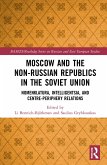The early Soviet Union's "nationalities policy" involved the formation of national republics, within which "nation building" and "modernization" were undertaken for the benefit of "backward" peoples. This book, in considering how such policies were implemented in Azerbaijan, argues that the Soviet policies were a form of imperialism. It details, in the period 1920 to 1940, how the two visions competed with each other, with eventually the pre-Soviet vision of Azerbaijani culture losing. The book concludes by exploring how pre-Soviet Azerbaijani culture survived to a degree underground, which was partially rehabilitated after the death of Stalin, and more fully in the late Soviet period.
Hinweis: Dieser Artikel kann nur an eine deutsche Lieferadresse ausgeliefert werden.
Hinweis: Dieser Artikel kann nur an eine deutsche Lieferadresse ausgeliefert werden.








